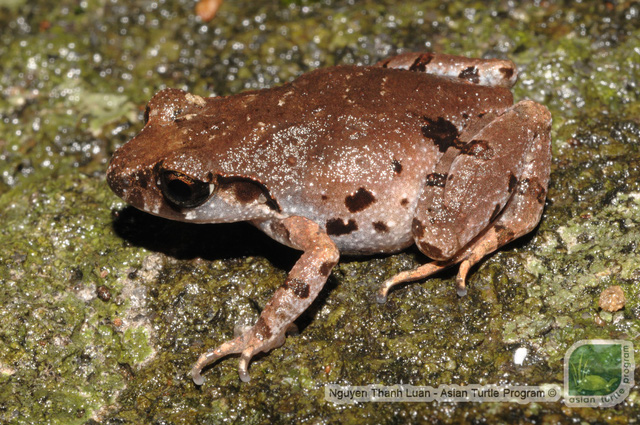The species’ habit and sound make them elusive
A new species of frog has been determined in Da Nang by Vietnamese and foreign scientists, after it first was noted five years ago.
The frog, endemic to the scenic Son Tra Peninsula, is Rowley’s litter frog, or in technical terms, Leptolalax rowleyae, which means the amphibian with the specific name of rowleyae, from the Leptolalax genus. Adult frogs of this species are less than three centimeters long, with the male shorter than the female.
The colors of their chest range from pinkish milk white to light brown, and the belly shows many white speckles. The amphibians are difficult to spot since they live under layers of dead leaves and plants upstream in the Son Tra area, and their sounds are similar to those from insects.
The new species bears a strong morphological resemblance to other amphibian species, but the acoustic and genetic research carried out by international scientists reveals a five percent difference in these respects, according to Dr. Phan Thi Hoa from the University of Da Nang, who noted the frog in 2017.
At the time she found a small population of frogs inhabiting Son Tra Peninsula at 400 meters above sea level while doing her Ph.D. thesis, but did not delve into it.
Later thanks to in-depth analysis of its acoustic and molecular qualities by domestic partners and experts from Russia and Canada, she and her student, Nguyen Thanh Luan, examined the frogs and concluded that the creatures form a new species.
A paper on the discovery was published in the March 2018 issue of Zootaxa, a high-quality peer-reviewed journal in zoology.
The name, Rowley’s litter frog, was created to honor Dr. Rowley Jodi, from Australian Museum, who has spent time researching and conserving amphibians in Vietnam since 2007, Dr. Hoa said.
She added that the finding suggests that Son Tra Peninsula enjoys great bio-diversity, which needs more caring attention.
It remains to be seen whether the new species is endangered, but the basic method of protection is preserving its habitat, which is a forest, and banning littering along streams in Son Tra.























































